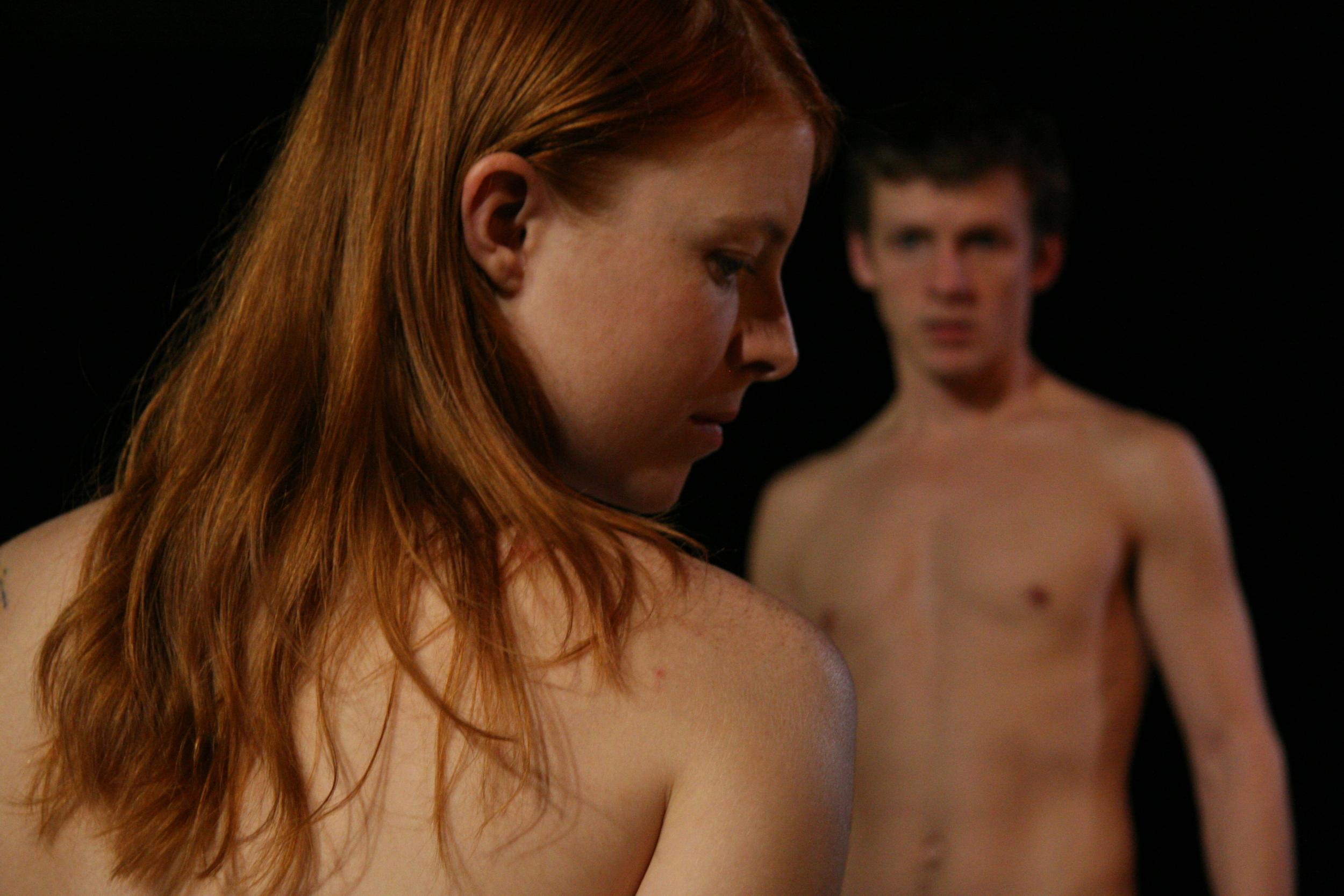Wallace Shawn’s A Thought in Three Parts, playing for two more shows at Yale Cabaret, directed by Hallie Cooper-Novack, has the reputation of being unproduceable because many of the acts the script calls for in the second part, “The Youth Hostel,” our society generally deems, if depicted on stage or screen, “pornographic.” To the extent that TTP offers transgression of polite theatrical norms—whatever we might conceive those to be—it’s courageous of the Cabaret to stage it, and for that reason this production and the Artistic Directors of the Cab are to be commended. In the quest for work that might be a bit unsettling or alienating, a play like Shawn’s has a certain cachet (it was only produced once in the States—in Austin in 2007—and its run in London, in 1977, occasioned debate about mores in art and a visit from the Vice Squad).

The play originated in 1976, fittingly, since its sexual politics smack very much of the era of endemic marital discord, pre-AIDS sexual explorations, masculine anxieties and aggressions in the age of feminist assertiveness, post-porn sexual license, and the taken-for-granted freedom that anything that can be thought can be said and shown. But what is the “thought” that gets depicted in these three parts (the other two are “Summer Evening,” and “Mr. Frivolous”)?
The production’s playbill provides some prose from Shawn: “…Sex is an extraordinary meeting place of reality and dream, and it’s also—what is not perhaps exactly the same thing—an extraordinary meeting place of the meaningful and the meaningless.” That’s close enough to a thought: to imply an “extraordinary meeting place” by making sex as ordinary as possible.
How ordinary? In “Evening,” the meeting place is a hotelroom, a bit too cher for the couple uncomfortably inhabiting it. Their dialogue thrives upon non sequitur and ellipsis, abounding in unfinished thoughts, mixed signals and occasional monologues or asides that show us suppressed desires: “I want to be hugged. I want to be bound up. I want to be kissed” David (Chris Henry) says, in Sarah’s absence; “I’d stick a hot poker up my ass if I thought I would like it,” Sarah (Lupita Nyong’o) confides to us. As the night progresses, all the false starts—and morbid talk about Sarah as a dead body—lead finally to contact. Henry and Nyong’o are good at speaking at cross-purposes, and Cooper-Novack’s sense of how they should fill the bedroom and, importantly, bed works well. The idea seems to be that when we want to get laid we don’t think straight, and all the couple say to each other enacts a screen of anxiety that only touch can penetrate.
Masturbation becomes the pivotal act in part two—something that four of the five cast members in “Hostel” are able to do alone even with others present. And even as a competition: the men aim at one of the women to see who can squirt the highest on her person, while the women battle over a dildo to see who can wield the wand most efficiently. As you might imagine, “Hostel” requires some ingenuity to stage properly—there is abundant nudity and sexual simulations that have to be convincing, otherwise the humor of the piece could misfire. The staging is effectively choreographed and the cast (Will Cobbs, Carmen Zilles, Jillian Taylor, Seamus Mulcahy) gamely bare their bodies while spouting the puerile dialogue—riddled with “gosh” and “gee” and forthright banter (“Oh, hi, Dick! Are you jerking off?”; “You’ve really got a good, sticky hole”; “You’re a shithead, Helen”)—with straight faces. As Tom, the husband, apparently, of Judy (Taylor), Josiah Bania’s part seems little more than a nasty surfacing of a reality principle otherwise suppressed in the name of comradely coming: he’s jobless, supported by his mother, and smacks Helen around to keep her in her place.
Finally, Max Roll, as Mr. Frivolous, delivers a short, fantasizing monologue with a musing awkwardness, but it seems to me that a take-off on Shawn’s grimacing sheepishness, à la My Dinner with Andre or Vanya on 42nd Street, would sound the right note of pained reverie to bring down the curtain on what we might imagine has been a supposedly tortured “thought” about sex—the always potential act that Woody Allen describes as “the most fun you can have without laughing.”
Photos by Ethan Heard; courtesty of Yale Cabaret
A Thought in Three Parts Written by Wallace Shawn Directed by Hallie Cooper-Novack The Yale Cabaret November 17-19, 2011
